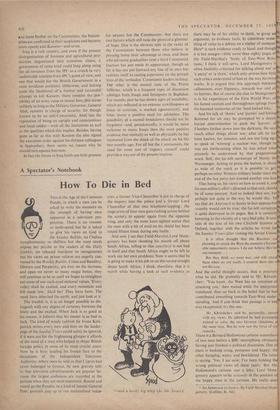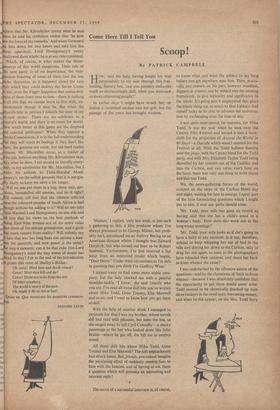A Sp ectator's Notebook
How To Die in Bed
Tuts is the Age of the Common Pundit, in which a man can be asked to write his memoirs on the strength of having once appeared in a television pro- gramme. There is no crooner so anthropoid but he is asked to give his views on God to the Sunday Babble, no Chelsea nymphomaniac so shiftless but she must needs expose her psyche to the readers of the Daily Gabble, no released murderer so unregenerate but his views on prison reform are eagerly can- vassed by the Weekly Rabble. Crime and Banditry, Distress and Perplexity, gre ever on the increase, and open we never so many magic boxes, they will continue to be so until we begin to straighten out some of our cock-eyed national values. 'Every valley shall -be exalted, and every mountain and hill made low.' Shall be? They have been. The meek have inherited the earth; and just look at it.
The trouble is, it is no longer possible to dis- tinguish wi(h any degree of certainty between the lowly and the exalted. When Jack is as good as his master, it follows' that his master is as bad as Jack. The kind of windy rubbish Sir Ivone Kirk- patrick writes every now and then on the leader- page of the Sunday Times could safely be ignored, if it were not for the frightening glimpse it affords of the mind of a man who helped to shape British foreign policy in some of its most crucial years. Now he is busy lending his frozen face to the deceptions of the Independent Television Authority; where once he told us that Cyprus had never belonged to Greece, he now gravely tells us that television advertisements are popular be- cause the largest audiences are recorded at the periods when they are most numerous. Round and round go the Pundits, in a kind of lunatic General Post; generals pop up to run nationalised indus- tries, a former Vice-Chancellor is put in charge of the-inquiry into the police and a former Lord Chancellor of that into telephone-tapping: the stage army of four men goes rushing across behind the scenery to appear again from the opposite wing, and only'the most keen-sighted notice that the man with a bit of mud on his shield has been round fifteen times during one battle.
And now I see that Field-Marshal Lord Mont- gomery has been shooting his mouth off about South Africa, telling us that apartheid is not bad in itself and that South Africa ought to be left to work out her own problems. Now it seems that he is going to make it his job to set the record straight about South Africa; I think, therefore, that it is worth while having a look at such evidence as '—and a lovely big whip like Mr. 311 wi there may be of his ability to think, to grasp at argument, to evaluate facts, to contribute some thing of value to a debate on a matter of moment Here* is such evidence ready to hand, and though it is but meagre—little more than eighty pages of the Field-Marshal's 'Study of East-West Rela- tions,' I think it will serve. Lord Montgomery is often foolishly criticised for talking about war a! 'a party' or 'a show,' which only proves how Intl( such critics understand of him or the way his mind works. It is argued that this approach betoken: callousness, even flippancy, towards war and all its horrors. But of course the clue to Montgomer: it is in his experiences of the First World War; all his famed caution and thoroughness springs from his haunted meinories of the land-locked lake.'
And his talk of 'shows' and 'parties' and hitting Rommel for six may be prompted by a deeply ti buried determination to push the horrors of Flanders farther down into the darkness. He say' much sillier things about war, after all; he ha been known, for instance, and not too long ago to speak of 'winning' a nuclear war, though hi was not forthcoming when he was asked wha precisely he understood by that preposterott ei word. Still, thei far-left stereotype of Monty the Warmonger. itching to press the button, is about as wide of the mark as it is possible to get 0 perhaps no other Western military leader since 1hz El end of the last party has wanted another one less That being so, his views on how to avoid it, and his non-military efforts directed to that end, should be of some interest. And so indeed they are, but perhaps- not quite in the way he would like. To say that An Approach to Sanity in fact approaches rt insanity would not be true; the far-left stereotype is quite destroyed in its pages. But it is certainlY hovering in the vicinity of a very bad joke. It con sists of the text of his two Chichele lectures a Oxford, together with the articles he wrote la the Sunday Times .after visiting the Soviel Union It is often thought that the Russians ari planning to attack the West the moment a favour able opportunity occurs. 1. do not believe this for one moment.
But they think we want war, and will :mad them when we are ready. I assured them this i not the case.
remarks.
There is a Bernard Hollowood cartoon somewhen of two men before a BBC microphone obvious)) having just finished a political discussion. One 01 them is looking smug, pompous and happy; thc other hangdog. weary and bewildered. The lane' is saying, 'Yes, I see now, I've been holding tilt wrong political views all these years.' But Mr Hollowood's cartoon was a joke; Lord Mont. gomery appears to•be seriously in the position ol the happy man in the cartoon. He really doe * AN APPROACH TO SANIty. By Field-Marshal Moot gomery. (Collins, 8s. 6d.) 1 1S Ii- of ter ad
Ti
clieve that Mr. Khrushchev meant what he said hen he told his credulous visitor that `he now w the force of my remarks.' And when Verwocrd t him down for two hours and told him lies bout apartheid, Lord Montgomery's vanity Wallowed them whole; he is at any rate consistent. Which, of course, is what makes the Mont- i, omerys of this world dangerous. Their talk of le he next party' is of no importance; the vain- d lorious boasting of some of them (not the one nder discussion, as it happens) about the ease
th which they could destroy the Soviet Union
• „, Ti war, even the trigger-happiness that comes over ,n °me of them from time to tincie—there is nothing nia all this that we cannot learn to live with, un-
'omfortable though it may be. But when the
enerals take to politics 1 unlatch the door of my iy jr-raid shelter. There are no subtleties in a eneral's world, and there is no room for doubt. , ow much better at this game are the despised ad rejected politicians! When they appoint a evlin Commission, it is in the full understanding hat they will reject its findings if they don't like hem; the gestures are made, but the hard reality mains. Mr. Macmillan never, as a matter of rinciple, believes anything Mr. Khrushchev says, lily what he does; I am second to literally every- ody in my admiration for Mr. Macmillan, but I refer his .attitude to Field-Marshal Mont- ornery's, on the selfish grounds that it is margin- Ily likely to keep me alive a bit longer.
Will no one put them in a bag, these vain, gar- ulous, bemedalled old ninnies, and tie it tight7 ill nobody tell him that the vileness inflicted Pon the coloured peoples of South Africa is bad nough without his adding to it? Will no one take ield-Marshal Lord Montgomery on one side and 11 him that his views on the best methods of sing East-West tension are of no more value an those of the nearest greengrocer, and a great eal more remote from reality? Will nobody say him that war has long been too serious a busi- ess for generals, and now peace is the same? ut stay a moment; can it be that even into Lord ontgomery's mind the tiny worm of doubt has el: °red its way? For at the end of his Introduction is e prints this verse of Shelly's Hellas:
Oh cease! Must hate and death return?
Cease! Must men kill and die?
Cease! Drain not to its dregs the urn Of bitter prophecy.
The world is weary of the past, Oh, might it die or rest at last!
Quite so. Que messieurs les assassins comtnen-
1
)1 L-
IS IS 11-
1 or 'Ti, Ire
'or
BERNARD LEVIN



























 Previous page
Previous page